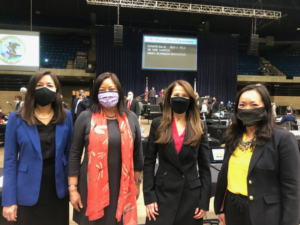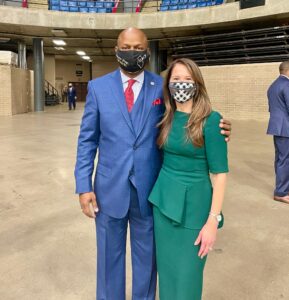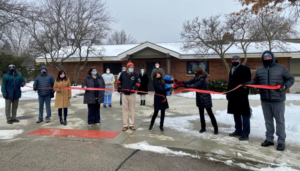


House Democrats have made a transformational change in our caucus by electing the first new Speaker of the House in a generation. I was proud to cast my vote for my colleague, Speaker Emmanuel “Chris” Welch, the first Black Speaker of the House in Illinois history. Speaker Welch represents real progress and I look forward to working with him as we lead Illinois through these uncertain times.
As the first Black Speaker of the House in Illinois’ 202-year history, his perspective and leadership is invaluable as we seek to combat racial inequity and anti-blackness in our communities. Speaker Welch has fought to expand access to healthcare for Illinois families, been a staunch ally of environmental organizations, and has been a leader in protecting a woman’s right to choose.
The election of a new Speaker is not the end of this historic transformation, it is just the beginning. Addressing the immense challenges that our state faces while identifying new opportunities will be a herculean effort. It will require bold leadership, innovative solutions, and difficult decisions. I am more confident than ever that our caucus, united around Speaker Welch, will rise to meet these challenges and work together to lead Illinois into a bright future.
- Requires two years of laboratory science and a foreign language to graduate high school.
- Requires the Illinois State Board of Education (ISBE) to annually assess all public-school students entering kindergarten.
- Extends early intervention services to three-year-old’s whose birthday falls between May 1st and August 21st.
- Requires ISBE and designated state agencies to report on the racial and ethnic demographics of the participants for each major program administered by the Board of designated department.
- Beginning with the next academic year, requires that every public high school provide access to students to each course identified by the Illinois Board of Higher Education (IBHE) for admittance to a state university.
- Requires a school district’s accelerated placement policy to allow for the automatic enrollment, in the following school term, of a high school student into the next most rigorous level of advanced coursework offered by the high school if the student meets or exceeds state standards in English language arts, mathematics, or science on a state assessment.
- Directs the Illinois P-20 Council to submit recommendations for learning recover actions for public school students in the wave of the coronavirus pandemic.
- Makes it a civil rights violation for an employer to use a conviction record as a reason to not hire, promote, or offer professional development to an individual (except in specifically outlined examples in statute).
- Requires any corporation that is required to file an EEOC report to submit the same data under section D to the Secretary of State who will publish the data on race, gender and ethnicity for each corporation on its website.
- Requires private businesses with 100 or more employees to receive an “Equal Pay Certificate”.
- Creates the Commission on Equity and Inclusion to review state of Illinois procurement practices.
- Increases the State’s aspirational goals for awarding state contracts to businesses owned by minorities, women or people with disabilities from 20% to 30%.
- Establishes the African Descent Citizens Reparations Commission.
- Creates the Illinois Community Reinvestment Act covering designated financial institutions chartered or incorporated under Illinois state law. Stipulates that each covered institution has a continuing and affirmative obligation to meet the financial services needs of the communities in which its offices, branches, and other facilities are maintained. The Secretary of Financial and Professional regulation is to adopt rules to assess whether such institutions are meeting the financial services needs of local communities.
- Requires each State agency and public institution of higher education shall annually submit a report, categorized by both race and gender, specifying the respective wage earnings of employees of that State agency or public institution of higher education.
- Caps, under the Predatory Loan Act, a 36 percent interest rate limit on consumer loans, including payday and car title loans.
- Requires a Disparity Study for Black Farmers.
- Creates the Cannabis Equity Commission.
- Increases housing access for those with criminal records.
- Places restrictions on deadly force by strengthening the requirements to use it.
- Adopts a blanket ban on chokeholds unless deadly force is otherwise authorized.
- Expands police residency requirements to all towns of over 100,000 population.
- Adopts new provision that collective bargaining agreements may not override state law.
- Creates the Qualified Immunity Task Force to review and reform qualified immunity as it applies to peace officers.
- Establishes a duty to intervene to stop another peace officer from using unauthorized force or force that exceeds the degree permitted regardless of chain of command.
- Establishes a duty to render aid and request emergency assistance regardless of whether an injury is a result of use of force.
- Bans the purchase of military equipment by law enforcement.
- Establishes a statewide body camera mandate to be rolled out over four years.
- Prohibits altering of body camera footage or redaction by the recording officer.
- Encourages the use of co-responder model of crisis response.
- Reforms rules regarding crowd control and use of rubber bullets and tear gas.
- Creates a misconduct offense if peace officers misrepresent facts, withhold knowledge of misrepresentation, or purposefully does not use a body camera to prevent activity from being recorded.
- Adopts whistleblower protections.
- Expands training for use of force and crisis intervention.
- Revises detainment rights to require that an individual in police custody be allowed free of charge three phone calls within 3 hours.
- Mandates that counsel for juveniles under 18 years old be present during interrogation if accused of murder or sexual offense.
- Establishes statewide services for officers’ mental health.
- Creates a robust certification process for local police officers.
- Abolishes the requirement of posting monetary bail except in certain cases.
CLAIM: Criminal justice reform is anti-police.
FACT: Nothing could be further from the truth. The tragic and unjustified killings of people of color have shattered trust between police and the communities they serve, and all the officers who serve with integrity have an interest in rebuilding that trust. Part of rebuilding trust is accountability. While the bill does require more accountability and makes changes to the use of force, it also provides resources officers need to do their jobs effectively. This includes new, innovative training and resources for officer’s mental health and wellness.
CLAIM: The package defunds the police.
FACT: This is partisan misinformation. Like all entities that receive public funding, we expect law enforcement agencies to adhere to best practices. This bill clarifies that one of these best practices is the use of body cameras.
CLAIM: Ending the cash bail system will make it harder for police to hold violent criminals in custody.
FACT: The truth is, this bill enhances law enforcement’s ability to hold violent offenders. We’ve seen how under the current system accused murders are able to bond out while indigent defendants accused of petty crimes are left in jail. This bill creates a smarter approach by basing these decisions on a court’s risk assessment, rather than simply on a defendant’s ability to pay.
CLAIM: The bill decriminalizes all drugs, even heroin and meth.
FACT: This is not in the bill in any way.
CLAIM: This bill means no conditional arrests for certain offenses.
FACT: In no way will police be prohibited from arresting a person who poses a risk to public safety. The bill directs officers to issue a citation rather than make an arrest in traffic cases along with Class B and Class C misdemeanors, but makes it clear this is only the case provided the subject poses no obvious threat.
CLAIM: This bill eliminates the felony murder rule.
FACT: The felony murder rule remains intact. The bill appropriately limits the application of this rule to those with a violent intent at the outset of a violent crime.


